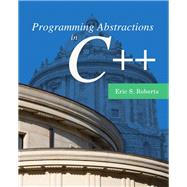This text is intended for use in the second programming course
Programming is a matter of learning by doing. Eric Roberts’ Programming Abstractions in C++ gives students opportunities to practice and learn with engaging graphical assignments. A client-first approach to data structures helps students absorb, and then apply the material.
Teaching and Learning Experience
This program presents a better teaching and learning experience—for you and your students. It will help:
- Improve Student Comprehension with a Client-first Approach to Data Structures: To aid in student understanding, this book presents the full set of collection classes early.
- Defer the Presentation of C++ Features that Require a Detailed Understanding of the Underlying Machine: Introducing collection classes early enables students to master other equally important topics without having to struggle with low-level details at the same time.
- Engage Students with Exciting Graphical Assignments: An open-source library supports graphics and interactivity in a simple, pedagogically appropriate way.
- Support Instructors and Students: The companion website provides source code, sample run PDFs, answers to review questions, and more.








